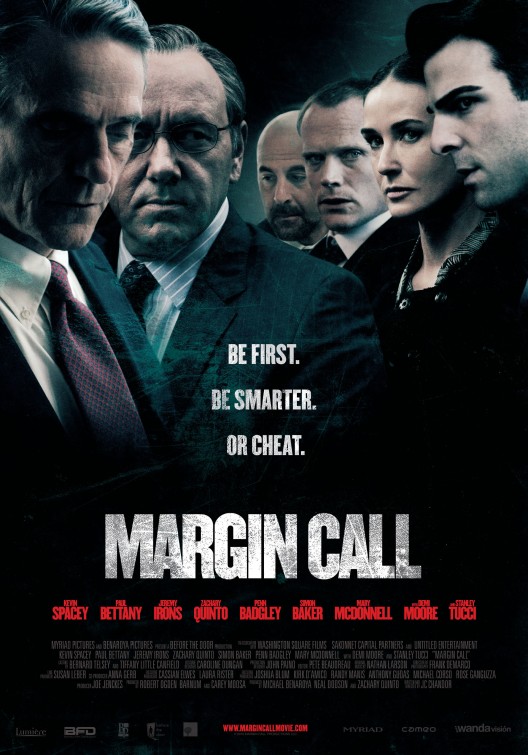Be First, Be Smarter Or Cheat
Director
J.C. Chandor
Starring
Kevin Spacey
Zachary Quinto
Paul Bettany
Jeremy Irons
Demi Moore
Margin Call opens on an unnamed Goldman Sachs style investment bank, as they execute mass layoffs, culling eighty per cent of their current staff. One unfortunate is Eric Gale [Stanley Tucci], who is informed that not only is he being let go but his company phone, car, email and building access is instantly revoked and he must leave the property immediately. Before he is escorted away one of his junior risk analysts, Peter Sullivan [Quinto], offers his sympathies and Gale asks him to look at the work he was unable to finish. Out of some sense of duty, Sullivan finishes piecing together the project and quickly realises that the projection models used to forecast volatility levels are completely incorrect and the firm is currently sitting on worthless assets. Furthermore a decrease in twenty five per cent would equate to a loss greater than the value of the firm. Over the next few hours this information is pushed through key supervisors, all of whom have the exact same reaction: denial, disbelief, despair, panic. Eventually the CEO’s private helicopter arrives and a roundtable discussion of how to quickly unload the toxic stocks quickly escalates. And that’s really all there is to it. This film does not try to explain the 2007-08 meltdown or even justify it, it simply demonstrates a roomful of people wondering how it got so out of hand, while simultaneously trying to pin the blame on each other and save their own arses. As such it’ll feel confusing as hell to anyone unfamiliar with how the economic world operates and incredibly simplistic and naïve to anyone with any degree of financial knowledge.
The key to this film’s success is the sheer powerhouse of acting talent and the almost theatrical style formatting. Technically, Margin Call is perfectly sound, lots of tight close-ups to capture every ounce of tension, coated in slick but subtle scoring by Nathan Larson. Without a doubt, we witness some of the best performances by the likes of Kevin Spacey, Paul Bettany and Jeremy Irons in years ..I’d add Stanley Tucci to that list but the man rarely puts a foot wrong. In a way, the acting also presents an unfortunate problem for Margin Call’s merits as a film. This time of year, audiences will be subjected to two types of award touts, the first being mediocre biopics with phenomenal lead performances and the second being heavyweight acting showcases on some contemporarily pertinent matter. This is obviously one of the latter, a slew of great actors vying for that one key emotional monologue amid a sea of expressive standalone static-shots. If anything, it proves that if actors are actually willing to make a statement, they will happily slash their fees and allow filmmakers to produce a solid body of work for the slender budget of 3.5 million dollars.
There will undoubtedly be comparisons with Wall Street but without Oliver Stone’s force-fed message or Glengarry Glen Ross minus David Mamet’s gift for oratory and ultimately, it’s a little of both and a lot of neither. Whereas it’s easy to compare the two, Margin Call’s well-acted snippet of a crisis will eventually fail in the long-run for its lack of focus. To explain, I wasn’t exactly sure what this film was trying to say, being a snapshot I was unable to tell whether I was supposed to sympathise with these corporate bastards or if they were being demonised. The only two individuals I actually felt bad for were Stanley Tucci (but only because he’s fired in the first five minutes) and Kevin Spacey because his dog died. Outside of that, these are stupidly intelligent people shifting numbers around for devious individuals and not one of them does the ‘right’ thing by performing seppuku. Furthermore, without clear protagonists or antagonists we’re left with an analysis of unscrupulous survival tactics employed by the powerful with a sly, suggestive undertone implying that in their position you would do exactly the same.
If I was feeling particularly malicious, I would say that this entire film boils down to little more than a handful of incredibly well delivered conversations. The very fact that said conversations are so well delivered, is the only reason I don’t hold that as a detrimental point. However, after walking away from the film with a disparaging outlook and momentarily worrying about your bills and mortgages and whatever, you remember that this is how capitalism works and that the film did little more than to remind you of something you already knew – the rich get richer and everyone else gets screwed over. That’s it, no more no less and it will never change. Personally, I didn’t need a film to tell me that.
Overall, it’s an incredible narrative debut for Mr. Chandor and worth watching for the performances alone but if you really want some insight into what happened with the financial crisis, you might want to watch Inside Job instead.
Release Date:
13th January 2012
The Scene To Look Out For:
Less of a scene this time and more of a feeling – bugger it, it’s my review and I can say what I want. One aspect that was used increasingly doubled as a ploy for audience members to understand the severity of the plot but also to highlight management incompetence. Every time someone is asked to explain why the firm has found itself in the position it’s in, someone has to dream up a colourful analogy. At first they start out with financial jargon but as we travel up the hierarchy, the explanations for the upper-echelons are almost farcically simplistic. At times I found it amusing, other times, cheap.. but it worked all the same.
Notable Characters:
As stated above, this really feels like a muscle flexing exercise by several generations of acting talent and the opportunity for this cast to work together. Having said that, Paul Bettany – despite his weird, shifting accent – offers something hitherto unseen from the likes of him and a really commendable (albeit blunt) and honest portrayal of frustrated middle-management.
Highlighted Quote:
“It’s just money, it’s made up. Pieces of paper with pictures on it so we don’t have to kill each other just to get something to eat”
In A Few Words:
“Poignant and well acted but without a clear message feels little more than a brilliant theatrical sparring session”
Total Score: 4/5
![The Red Right Hand Movie Reviews [Matthew Stogdon]](https://reviews.theredrighthand.co.uk/wp-content/uploads/2021/12/cropped-header1.png)




